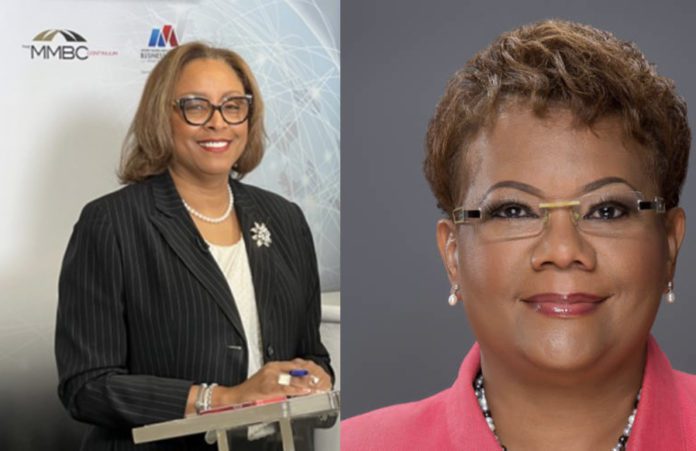In Philadelphia, about 67 percent of the city’s minority enterprises were not “technology ready” when COVID-19 disrupted business as usual, said Della Clark, president and CEO of The Enterprise Center, a minority business development agency there.
Clark, a 28-year minority enterprise expert, spoke during the annual Economic Development Forum (EDF) hosted by the Memphis Minority Business Continuum (MMBC) this week (July 21-22). EDF addressed strategies for overcoming unexpected business disruptions, such as those caused by the coronavirus pandemic.
Jozelle Booker, MMBC president and CEO, joined Clark in a session discussing problems minority and women-owned business enterprises (MWBEs) faced in Philadelphia and Memphis, and specific outcomes.
Both cities have large Black populations – Philadelphia at 44 percent and Memphis at 64 percent. Philadelphia is larger with 1.6 million residents vs. Memphis at 651,000.
Many brick-and-mortar MWBEs had to switch to virtual platforms, making it tough to adjust without proper equipment or capital.
“Your computer had to have a camera with audio … many of them did not,” said Clark, regarding Philadelphia’s minority businesses. “So they could not pivot – for example – if they were a retailer to E-commerce.”
A second thing recognized from the pandemic, said Clark, “is that many of our small businesses had very little cash reserves. … those that had cash reserves were able to survive the storm that came.”
Those that did not?
“(T)hat’s why we had significant shutdowns of minority businesses that may not be able to come back as we come out of this pandemic and as we attempt to ‘not’ struggle with the add-on of the Delta variant that’s coming about,” said Clark.
Booker said tourism, retail and restaurant industries were hardest hit nationwide since they were the first to close to slow the spread of COVID-19.
Distribution, construction, trade and service industries were mostly unaffected “if they had the size and scale to have multiyear contracts or purchase orders with companies or governments that were fully operational,” she said.
Clark said Philadelphia MWBEs reviewed how they conducted business in past decades, finding that collaboration is needed to mitigate disruptions.
Now she is seeing “intentionality” like never before as MWBEs lay out plans for recovery.
Realities exposed by the pandemic – plus the killing of George Floyd by a Minneapolis, Minnesota policeman and the aftermath – are two things Clark said raised interest in supporting minority businesses.
Mitigating disruptions requires spend opportunities, said Booker.
In Memphis, MMBC, the Greater Memphis Chamber and the Memphis Medical District Collaborative have launched spend initiatives to keep more funds in the city versus going outside for contracts.
In Philadelphia, The Enterprise Center helps MWBEs make successful pivots.
Providing an example, Clark said an established HVAC company was losing revenue during Philadelphia’s construction slowdown. The company started a new business disinfecting surfaces to prevent coronavirus spread.
The Enterprise Center helped the MWBE obtain a major cleaning contract. That MWBE is now an emergency response service, disinfecting facilities in multiple states where people have tested COVID-19 positive.
Clark’s agency then created a consortium of smaller janitorial firms to expand their opportunities.
Capital is key to survival and growth
The Enterprise Center, a CDFI (Community Development Finance Institution) for Philadelphia MWBEs, was recently licensed as a SBIC (Small Business Investment Company) to help MWBEs nationally with capital needs.
Clark supports a blend of debt and capital, advising MWBEs to first seek CDFI loans in early stages.
Once the loan is paid, this “track record” can support bank financing.
If an MWBE pursues bank loans first, the balance sheet becomes very important, said Clark, noting that the balance sheet and track record influence bank approval.
“If an MWBE wants to take larger jobs, they must focus on the balance sheet,” she said.
According to Clark, many MWBEs are reluctant to invest in financial audits or reviews, or spend time with a CPA or accountant on a regular basis.
“You need two things. You need a good attorney and a good accountant,” she said.
“They need to become your ‘best friends’ and you need to meet with them on a regular basis, not just when your taxes are due, or not just when you’re going to get a loan.”
Resiliency comes in many forms
Entrepreneurship, said Clark, is a key reason many workers in restaurant and hospitality fields are not returning to those jobs.
She referenced a Philadelphian, who lost his job, bought a lawnmower and is no longer interested in a job because of the money he generates cutting lawns.
“Resilience goes all the way up and down, and across, because people have found new ways to survive,” she said. “I don’t think people are just depending on unemployment benefits. I think people have become entrepreneurs. …
“We saw many small businesses selling PPE (personal protective equipment) products from masks to gloves.”
Research labs and hospitals were mentioned as hotbeds for MWBE contracting opportunities. Staffing agencies also are in high demand.
“There’s a real opportunity for black and brown businesses to get into construction, infrastructure, bridges, highways and those things,” said Clark, asserting that an infrastructure bill will get passed by Congress.
“Those are hot industries that we need to start preparing for now.”
Awarding contracts on a level playing field
Nationwide, the pandemic triggered conversations among leaders in public and private sectors about how contracts are awarded, shining light on racial injustices that have existed for decades, said Clark.
“If the same people are at the table awarding contracts, then minorities get left out. … Sometimes, it’s not because we’re not bidding, but because they don’t want us to get the business.”
Still, Clark is optimistic that the nation will develop a more just economy with an equal system where minorities with competitive bids and capital can win better contracts.
She said MWBEs frequently get approved as subcontractors or sub-subcontractors, but not prime contractors.
“I think we have to stop that.”




